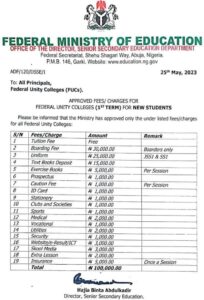CURRENT REPORTS BLOG: The Federal Government’s recent decision to increase school fees for Federal Unity Colleges (FGCs) from ₦45,000 to ₦100,000 has stirred up significant discussions and controversy. This directive, addressed to all principals of Federal Unity Colleges, was issued by the Office of the Director of Senior Secondary Education Department of the Federal Ministry of Education.
Details of the Fee Increase
As stated in the circular titled “Approved fees/ charges for Federal Unity Colleges (1st Term) for new students,” signed by the Director of Senior Secondary Education, Hajia Binta Abdulkadir, new students are now required to pay ₦100,000 instead of the previous ₦45,000. This substantial increment is expected to affect various aspects of school life, including tuition and boarding fees, uniforms, textbooks, deposits, exercise books, prospectus, caution fees, ID cards, stationery, clubs and societies, sports, extra lessons, insurance, and more.
Impact on Students and Parents
The sudden increase in school fees is likely to impose significant financial burdens on students and their parents. For families already struggling to meet the costs of education, this additional financial strain could lead to difficulties in accessing quality education for their children. The hike in fees could also deter potential students from enrolling in Federal Unity Colleges due to affordability concerns.
Controversy and House of Representatives’ Resolution
In response to the fee increment, the House of Representatives passed a resolution on July 11, urging the Federal Government to reverse the decision in all federal government-owned secondary schools. The motion was moved by Saidu Abdullahi (APC, Niger) and Kama Nkemkanma (LP, Ebonyi). Nkemkanma, while presenting the motion, highlighted the untold hardship the fee hike was causing for students and their families.
Implications and Way Forward
The fee increment has sparked a nationwide debate on the accessibility and affordability of education in Nigeria. It underscores the need for the government to consider the socioeconomic realities of its citizens while making such policy decisions. As the controversy continues, it is essential for relevant stakeholders, including the government, education policymakers, and parents’ associations, to engage in constructive dialogue to find a sustainable solution.














